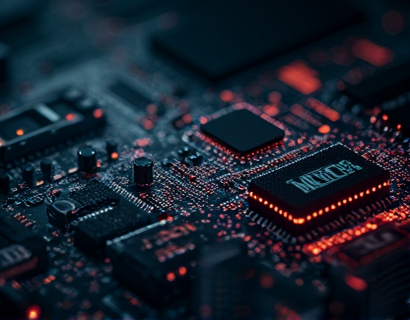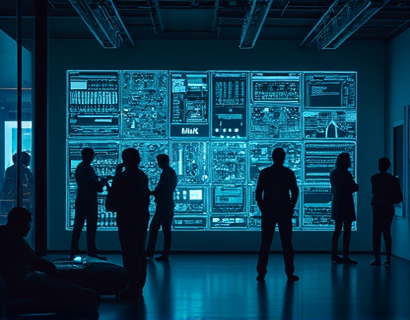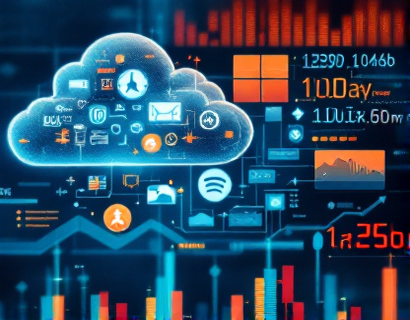Decentralized Productivity: Turbo-Charged with AI and Crypto Integration
The integration of artificial intelligence (AI) and cryptocurrency is revolutionizing the way we approach productivity and user experience. This fusion of technologies is not just a novel concept but a practical solution that enhances efficiency, security, and accessibility in digital workflows. For tech enthusiasts, professionals, and early adopters, understanding this transformation is crucial as it paves the way for a more decentralized and intelligent future.
The traditional centralized models of productivity tools are being challenged by decentralized platforms that leverage blockchain technology and AI. These platforms offer a new paradigm where data is secure, transactions are transparent, and users have greater control over their digital assets. This article delves into the transformative tools that are redefining productivity and user experience, providing insights for those keen on exploring the intersection of AI, cryptocurrency, and decentralization.
Enhancing Productivity with AI
AI has become an indispensable tool in modern productivity ecosystems. By automating repetitive tasks, AI frees up time for more complex and creative work. Smart assistants, predictive analytics, and automated workflows are just a few examples of how AI is streamlining processes. In a decentralized environment, AI can be even more potent, as it can operate across multiple nodes and platforms without the need for a central authority.
For instance, AI-driven project management tools can predict project timelines, allocate resources efficiently, and identify potential bottlenecks before they occur. These tools use machine learning algorithms to analyze historical data and adapt to new inputs, ensuring that workflows are optimized continuously. In a decentralized setting, such tools can coordinate tasks across different teams and locations, ensuring seamless collaboration and high productivity.
Security and Trust through Cryptography
One of the most significant advantages of integrating cryptocurrency into productivity tools is the enhanced security it provides. Blockchain technology ensures that data is immutable and tamper-proof, which is crucial for sensitive business information. Smart contracts, self-executing contracts with the terms directly written into code, can automate and enforce agreements without the need for intermediaries. This not only reduces the risk of fraud but also speeds up processes.
In a decentralized productivity ecosystem, user data and transactions are encrypted and stored across a network of nodes, making it extremely difficult for hackers to compromise the system. This level of security is particularly important for businesses handling confidential information. Moreover, the transparency of blockchain allows users to verify transactions and data integrity, building trust among collaborators.
Decentralized Storage and Computing
Decentralized storage solutions, such as IPFS (InterPlanetary File System), offer a robust alternative to traditional cloud storage. IPFS distributes files across a network of nodes, ensuring that data is not stored in a single location and is highly resilient to failures. This decentralized approach not only enhances data availability but also reduces costs and improves privacy.
Combining decentralized storage with AI-powered computing resources creates a powerful synergy. AI algorithms can be executed on a distributed network, leveraging the computational power of multiple nodes. This setup, known as decentralized computing, allows for scalable and efficient processing of large datasets without the need for centralized servers. For businesses, this means access to high-performance computing resources without the overhead of maintaining expensive infrastructure.
User Experience in Decentralized Platforms
User experience (UX) is a critical factor in the adoption of any new technology. Decentralized platforms that integrate AI and cryptocurrency must prioritize UX to ensure that users find the tools intuitive and valuable. This involves designing interfaces that are user-friendly, responsive, and accessible across various devices.
AI can play a significant role in enhancing UX by personalizing the user interface based on individual preferences and behavior. For example, AI can analyze a user's workflow and suggest optimizations, such as shortcuts or automated tasks. Additionally, natural language processing (NLP) can enable voice commands and chatbot interactions, making the platform more accessible and convenient to use.
Cryptocurrency integration can also improve UX by providing seamless payment solutions within the platform. Users can transact in real-time without the delays and fees associated with traditional payment methods. This is particularly beneficial for global teams and businesses that operate across different currencies and regions.
Case Studies and Real-World Applications
Several platforms are already demonstrating the potential of AI and cryptocurrency in enhancing productivity and user experience. For example, a decentralized collaboration tool uses AI to manage project timelines and resource allocation, while storing all project data on a blockchain for security and transparency. Users have reported significant improvements in team coordination and project completion times.
Another example is a decentralized marketplace for freelance services, where AI matches clients with the most suitable freelancers based on skill sets and availability. Transactions are handled through a cryptocurrency, ensuring secure and instant payments. This platform has seen a high adoption rate, with users praising the efficiency and trustworthiness of the system.
Challenges and Future Prospects
Despite the numerous benefits, the integration of AI and cryptocurrency in productivity tools is not without challenges. One of the main hurdles is the technical complexity involved in building and maintaining decentralized systems. Developers need to have a deep understanding of both AI and blockchain technologies to create robust and scalable solutions.
Another challenge is the regulatory landscape. As cryptocurrency and decentralized technologies are still evolving, regulatory frameworks are often unclear or inconsistent. This can create uncertainty for businesses looking to adopt these solutions. However, as more organizations embrace decentralization, we can expect clearer guidelines and more supportive policies.
Looking ahead, the future of decentralized productivity tools is promising. Advances in AI, such as more sophisticated machine learning models and edge computing, will further enhance the capabilities of these tools. The growing acceptance of cryptocurrency and the development of more user-friendly wallets and exchanges will also drive adoption.
In conclusion, the fusion of AI and cryptocurrency is transforming productivity tools, offering unprecedented levels of efficiency, security, and user experience. For those interested in the future of digital innovation, understanding and embracing these technologies is essential. Whether you are a tech enthusiast, a productivity professional, or a business owner, the potential benefits of decentralized and AI-driven solutions are undeniable.










































